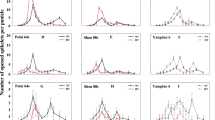Abstract
This experiment was conducted to evaluate the varietal differences of spikelet sterility response to air temperature during the reproductive stage. Six rice varieties differing in maturity group (early-maturing; Unkwangbyeo, Odaebyeo, medium-maturing; Andabyeo, Hwasungbyeo, and mid-late maturing; Donganbyeo, Chuchungbyeo) were grown under ambient temperature (AT) conditions before being transferred to the temperature-controlled plastic houses. For the synchronization of the growth stage, 15 rice seedlings (2011) and 10 rice seedlings (2012) per pot were transplanted in a circle and only main stems were grown by removing tillers at early stage of their emergence. At the initial heading stage, pots for each variety were transferred to the four plastic houses that were controlled to AT, AT + 1.5°C, AT + 3.0°C, and AT + 5.0°C, respectively. Spikelet fertility was significantly decreased due to high temperature-induced spikelet sterility at AT + 3.0 and/or AT + 5.0°C treatment during flowering time in 2011. Spikelet fertility in 2012 was much lower than in 2011 even at the AT treatment because of high temperature-induced spikelet sterility at the micosporogenesis stage. Critical temperature (Tc) that induces 50% spikelet sterility at flowering time was estimated by fitting the temperature response of spikelet fertility to a logistic function. Tc ranged from 34.6°C (Odaebyeo) to 39.7°C (Hwasungbyeo), Odaebyeo being significantly more sensitive to high temperature-induced spikelet sterility than the other varieties. This result has shown that response of spikelet sterility to higher temperature is different according to rice varieties. However, further study should be done to arrive at a concrete conclusion.
Similar content being viewed by others
References
Endo M, Tsuchiya T, Hamada K, Kawamura S, Yano K, Ohshima M, Higashitani A, Watanabe M, Makiko KK. 2009. High temperature cause male sterility in rice plants with transcriptional alterations during pollen development. Plant Cell Physiol. 50(11): 1911–1922
Jagadish SVK, Craufurd PQ, Wheeler TR. 2007. High temperature stress and spikelet fertility in rice(Oryza sativa L.). J. Exp. Bot. 58(7): 1627–1635
Korea Climate Change Assessment Report. 2010. National Institute of Environmental Research, Seoul, Korea
Matsui T, Omasa K. 2002. Rice (Oryza sativa L.) cultivars tolerant to high temperature at flowering: anther characteristics. Ann. Bot-London, 89: 683–687
Nguyen DN, Lee KJ, Kim DI, Nguyen TA, Lee BW. 2014. Modelling and validation of high-temperature induced spikelet in rice. Field Crops Res. 156: 293–302
Nishiyama I. 1984. Climatic influrence on pollen formation and fertilization, In S Tsunoda, N Takahashi, eds, Biology of Rice, Elsevier Amsterdam, pp 153–171
Peng SB, Huang JL, Sheehy JE, Laza RC, Visperas RM, Zhong X, Centeno GS, Khush GS, Cassman KG. 2004. Rice yield decline with higher night temperature from global warming. Proc. Natl. Acad. Sci. USA, 101: 9771–9975
Satake T, Yoshida S. 1978. High temperature-induced sterility in indica rices at flowering. Jpn. J. Crop Sci. 47, 6–17
Yoshida S. 1981. Fundamentals of Rice Crop Science. International Rice Research Institute Los Baños, Philippines, pp 72–76
Author information
Authors and Affiliations
Corresponding author
Additional information
Both authors contributed equally to this work.
Rights and permissions
About this article
Cite this article
Lee, KJ., Kim, DI., Kim, K.S. et al. Genotypic difference in spikelet sterility response to air temperature during the reproductive stage of rice. J. Crop Sci. Biotechnol. 17, 53–57 (2014). https://doi.org/10.1007/s12892-014-0032-2
Received:
Revised:
Accepted:
Published:
Issue Date:
DOI: https://doi.org/10.1007/s12892-014-0032-2




